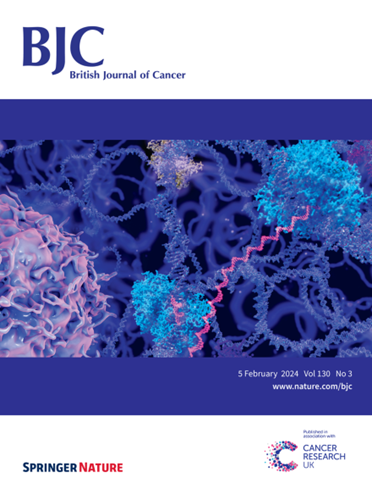Breast cancer metastasis progression is associated with elevated activity of kynurenine monooxygenase and kynureninase
IF 6.4
1区 医学
Q1 ONCOLOGY
引用次数: 0
Abstract
Metastasis remains the major cause of death in breast cancer (BrCa) and lacks specific treatment strategies. The kynurenine pathway (KP) has been suggested as a key mechanism facilitating progression of BrCa. While KP activity has been explored in primary BrCa, its role in metastasis remains unclear. To better understand this, we examined changes in the KP of BrCa with no metastasis compared to BCa that produced local or distant metastases. Given that the cancer cell secretome plays a role in metastasis, we also investigated the relationship between changes in KP activity and serum proteins of patients with local or distant metastases. To investigate changes in the KP in BrCa, with and without metastasis, we quantified KP metabolites in blood sera collected from patients with stage 1 BrCa (n = 34), BrCa with local metastases (n = 46), BrCa with distant metastases (n = 20) and healthy controls (n = 39). The serum protein profile of the BrCa patients with local or distant metastasis was determined before correlation analyses were carried out to examine the relationship between changes in the KP and cancer serum proteins using SPSS. We found that the KP was elevated in BrCa patients with local and distant metastasis compared to healthy controls and stage 1 BrCa patients. The activity of kynurenine monooxygenase (KMO) and kynureninase (KYNU) A was positively associated with disease stage and was higher compared to healthy controls. Proteome analysis in patients with local or distant metastasis revealed the dysregulation of 14 proteins, 9 of which were up-regulated and 5 down-regulated at the distant metastasis stage. Importantly, three of these proteins have not been previously linked to BrCa metastasis. In the correlation studies between the KP profile, cancer serum proteins and metastasis status, KYNU A had the greatest number of significant associations with cancer serum protein, followed by KMO. Our findings reveal that the KP was regulated differently at various stages of BrCa and was more dysregulated in patients with local or distant metastasis. These KP activity changes showed a significant association with cancer serum proteins in BrCa patients with local or distant metastasis, highlighting the potential role of KP in BrCa metastasis.

乳腺癌转移的进展与犬尿氨酸单加氧酶和犬尿氨酸酶活性的升高有关。
导言:转移仍然是乳腺癌(BrCa)的主要死因,而且缺乏特定的治疗策略。犬尿氨酸途径(KP)被认为是促进乳腺癌进展的关键机制。虽然 KP 在原发性乳腺癌中的活性已被探究,但其在转移中的作用仍不清楚。为了更好地理解这一点,我们研究了未发生转移的 BrCa 与发生局部或远处转移的 BCa 相比 KP 的变化。鉴于癌细胞分泌组在转移中发挥作用,我们还研究了局部或远处转移患者的 KP 活性变化与血清蛋白之间的关系:为了研究有转移和无转移的 BrCa 中 KP 的变化,我们定量检测了 1 期 BrCa 患者(34 人)、有局部转移的 BrCa 患者(46 人)、有远处转移的 BrCa 患者(20 人)和健康对照组(39 人)血清中的 KP 代谢物。在对有局部或远处转移的 BrCa 患者的血清蛋白谱进行测定后,使用 SPSS 对 KP 与癌症血清蛋白变化之间的关系进行了相关分析:结果:我们发现,与健康对照组和 1 期乳腺癌患者相比,局部和远处转移的乳腺癌患者的 KP 升高。犬尿氨酸单加氧酶(KMO)和犬尿氨酸酶(KYNU)A的活性与疾病分期呈正相关,与健康对照组相比更高。对局部或远处转移患者的蛋白质组分析表明,在远处转移阶段有14种蛋白质失调,其中9种上调,5种下调。重要的是,其中三种蛋白质以前从未与 BrCa 转移联系在一起。在KP图谱、癌血清蛋白和转移状态之间的相关性研究中,KYNU A与癌血清蛋白的显著相关性最多,其次是KMO:我们的研究结果表明,KP在乳腺癌的不同阶段受到不同的调控,在有局部或远处转移的患者中调控失调的程度更高。这些KP活性变化与局部或远处转移的BrCa患者的癌血清蛋白有显著关联,突出表明了KP在BrCa转移中的潜在作用。
本文章由计算机程序翻译,如有差异,请以英文原文为准。
求助全文
约1分钟内获得全文
求助全文
来源期刊

British Journal of Cancer
医学-肿瘤学
CiteScore
15.10
自引率
1.10%
发文量
383
审稿时长
6 months
期刊介绍:
The British Journal of Cancer is one of the most-cited general cancer journals, publishing significant advances in translational and clinical cancer research.It also publishes high-quality reviews and thought-provoking comment on all aspects of cancer prevention,diagnosis and treatment.
 求助内容:
求助内容: 应助结果提醒方式:
应助结果提醒方式:


